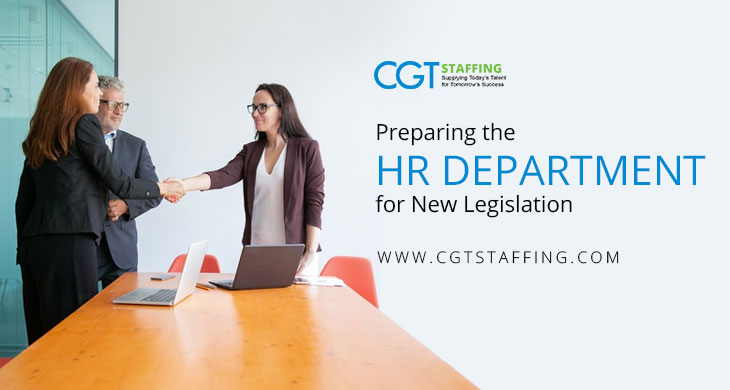The Human Resources function is a key business process in most organizations. However, many people fail to understand the magnitude of its role. While it’s true that HR departments are responsible for implementing talent acquisition strategies as well as workforce management and retention, many hiring managers generally prefer outsourcing the hiring function to a specialized staffing agency. As a result, recruitment is a single component of the larger HR processes. One of the key responsibilities for HR functions that many people tend to overlook is corporate compliance. Specifically, the HR function is meant to ensure the organization complies with corporate legislation and regulation, particularly concerning employer’s responsibilities at the local, state, and federal levels.
Table of Contents
Positioning HR Functions to Ensure Compliance
As far as the HR department is concerned, it should focus on meeting compliance requirements revolving around the employer-employee relationship. Almost every country has some form of labor laws, workplace health and safety rules, wage protection regulations, and anti-discrimination legislation. For example, the United States Fair Labor Standards Act governs things like minimum wage, overtime pay, workers’ civil rights under federal rules, and protecting workers from discrimination based on gender, ethnicity, race, religion, or disability.
Similarly, the FMLA or Family Medical Leave Act lays down the rules for circumstances where employees have the right to take paid and unpaid leaves for up to 12 weeks a year. The FMLA also guarantees such workers the right to return to the same role at the end of the leave. The USERRA regulates the rights and reemployment of workers who are drafted into active military duty. The role of the HR function, therefore, is not limited to hiring talent and managing workforces with tools like performance appraisals. It extends to ensuring the organization remains compliant with all laws and regulations concerning employer-employee relationships that apply to the business. Here are a few steps that can help you create a more compliance-focused HR function:
Hire Talent with Corporate Compliance Experience
Having the right talent deployed to the right job is a major ingredient for success, for the individual, the team, and the department. When a business needs cybersecurity consulting, it will usually hire a cybersecurity specialist. While HR is usually sourcing and onboarding this talent, the department itself may have key talent gaps that may limit its ability to comply with corporate rules and regulations. The solution is, quite simply, to hire specialized talent that has the knowledge and necessary expertise to improve HR compliance and bring the rest of the team up to speed on any new developments. HR functions will always need specialized talent, such as corporate compliance experts, to revitalize their compliance approach and implement it in ways that are relevant to changing workforces.
Educate and Train HR Personnel on New Legislation and Rules
It is not sufficient merely to hire new HR talent that specializes in corporate compliance. The entire HR branch needs to be aware of compliance rules, especially important new legislation that impacts their compliance structure. This is where the power of educating and training workers can be applied to the HR function itself. Regular training sessions, recaps, and condensed reading material can go a very long way to help HR workers align themselves better with new legislative changes, and remain firmly on the right side of compliance.
Create, Maintain, and Constantly Update Your Employee Handbook
The employee handbook is usually created by an HR representative. It is meant to act as a collection of company policies governing the employer-employee relationship. The handbook typically contains any information an employee could want, including legally acceptable ways of addressing grievances or conflicts. With legislation and regulations changing frequently, it is important that the employee handbook always accurately reflects the changes. That means your HR department needs to maintain and periodically update the handbook. Not doing so could lead to potentially damaging litigation later on, and maybe even a review by the relevant regulatory bodies.
Schedule Audits to Measure HR’s Compliance Capacity
Businesses always have to make do with a finite volume of resources, and the HR function is no exception. In fact, since HR does not directly contribute to generating revenue, many businesses tend to spare the bare minimum budget to keep it running. That means most HR functions are typically understaffed and overworked. This automatically implies efficiency, which can impact your compliance efforts. To mitigate the risks of this happening, you should carry out several scheduled HR compliance audits during a business year. This will help you get a fair assessment of HR’s capacity to comply with laws and regulations and fill any gaps that are apparent in that ability.
